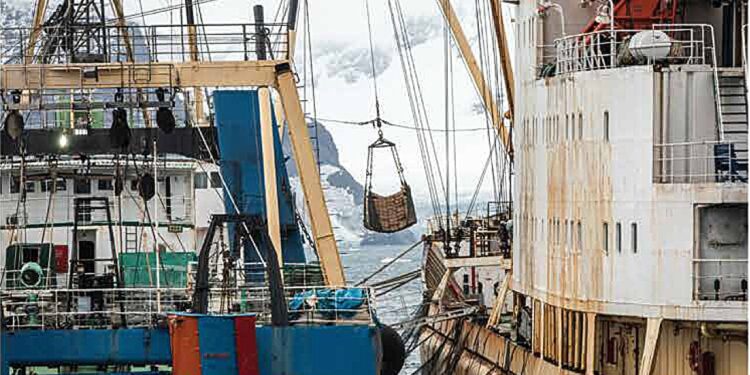Transshipments at sea. (A) Ship-to-ship transfer between a krill fishing vessel and the Russian-flagged reefer Pamyat Kirova (OMI 8701040), operated by Baltmed Reefer Services (Greece) and owned by Laskaridis (Greece) in the South Orkney Islands, Antarctica (February 2020). ). Credit: Andrew McConnell/Greenpeace
Fish taxis – reefer or refrigerated cargo ships that function as mobile ports for fishing boats – are often described as weak links in the traceability of the seafood value chain. For the first time, research has identified the owners of all refrigerated vessels used around the world, the flags they use and the fishing vessels they encounter.
The new article, published in Scientific advancesshows that just 324 owners are responsible for all fish transshipments worldwide, with China, Russia and Greece playing a significant role. “A major step towards more transparency,” says lead author Frida Bengtsson of the Stockholm Resilience Center at Stockholm University.
Refrigerated cargo ships – or “reefers” – play an important role in the seafood industry. For example, almost a third of the world’s tuna catch (worth $10.4 billion) is transshipped each year.
Transshipment, the transfer of catches but also people, spare parts and fuel between a fishing vessel and a refrigerated vessel, has repeatedly been described as opaque and associated with illegal activities, as it can enable the transfer illegally caught species or mask the origin of seafood.
Fishing practices at sea were once out of sight and out of mind, but recent advances in collecting and sharing vessel-level satellite data mean that researchers and the public can now see where vessels are operating. However, there is one missing piece: knowing who owns the refrigerated vessels used for transshipment of seafood.
“Understanding who actually owns a vessel offers new levers and opportunities to improve the governance and oversight of this practice,” explains Frida Bengtsson, the lead author of the study.
In this study, researchers from the Stockholm Resilience Center, the Stanford Center for Ocean Solutions and the University of British Columbia identified 569 refrigerated vessels currently used in the fishing industry and their 324 beneficial owners.
Just 10 of these owners account for almost a quarter of all transshipments worldwide. Considering the volumes of seafood transhipped, this is a surprisingly small and very manageable number of players, explains Frida Bengtsson:
“If we work with these key players and get them to improve their operations, we could quickly improve seafood traceability and sustainability.”
The new research also mapped the locations in the ocean where reefer owners operate their vessels, the gear used by the fishing vessels they encounter and the flags involved.
All this data is now freely accessible and viewable using an online tool. This unprecedented transparency can become a key tool for NGOs, insurance companies and financial actors interested in creating stronger incentives for sustainable behavior at sea.
More information:
Frida Bengtsson, Who owns the refrigerated ships? Discover the ecosystem of transshipment in fishing, Scientific advances (2024). DOI: 10.1126/sciadv.adn3874. www.science.org/doi/10.1126/sciadv.adn3874
Provided by Stockholm Resilience Center
Quote: New study reveals key players in global transshipment, strengthening seafood transparency (2024, October 11) retrieved October 11, 2024 from
This document is subject to copyright. Except for fair use for private study or research purposes, no part may be reproduced without written permission. The content is provided for informational purposes only.



